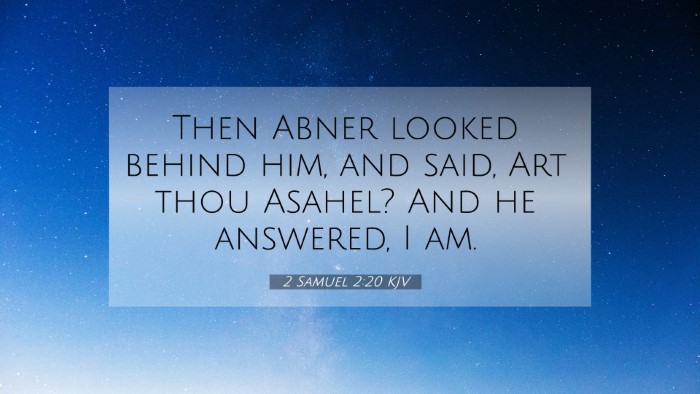Understanding 2 Samuel 2:20
Bible Verse: 2 Samuel 2:20
Verse Text: “Then Abner looked behind him and said, ‘Is that you, Asahel?’ He answered, ‘It is I.’”
Summary of Verse Meaning
This verse captures a pivotal moment in the narrative involving Abner and Asahel during the conflict between the house of Saul and the house of David. Asahel, one of the sons of Zeruiah, confronts Abner on the battlefield. His identity is affirmed when he responds to Abner’s inquiry. This exchange sets the stage for further developments, highlighting themes of loyalty, conflict, and the brutal realities of civil war in Israel.
Commentary Insights
- Matthew Henry's Commentary: Henry emphasizes the courage and determination of Asahel, noting that his swift pursuit of Abner demonstrates the zealous loyalty to David. However, this also reflects the peril of engaging in conflict without foresight, as Asahel's fate becomes a sobering reminder of the consequences of pride and haste in battle.
- Albert Barnes' Notes: Barnes provides a contextual analysis of the significance of Asahel's role in this confrontation. He discusses the motivations of both Asahel, driven by the desire for glory, and Abner, who is trying to manage the volatile situation. Barnes points out that identifying oneself in battle is a crucial aspect of leadership and valor.
- Adam Clarke's Commentary: Clarke highlights the character of Asahel, illustrating his relentless nature. He interprets the dialogue as indicative of the personal stakes involved in the conflict, signifying deeper loyalties that transcend mere military obligation. Clarke warns against the implications of pride as it may lead individuals into dangerous situations.
Theological Themes
This verse touches upon several prominent themes within the biblical narrative:
- Loyalty and Betrayal: Asahel’s loyalty to David is juxtaposed with the existing tensions from Saul’s house, intensifying the sense of strife.
- Identity in Conflict: The emphasis on identity highlights the need to understand one’s place within the larger narrative of God’s plan.
- The Danger of Ambition: Asahel’s ambition leads him into a threatening encounter that exemplifies the perils faced when zeal overtakes wisdom.
Cross-References
This verse can be cross-referenced with several others to draw further insights:
- 1 Samuel 26:20: Illustrates the conflict between Saul and David, providing context to the rivalry.
- 1 Kings 2:5: References conflict among the leaders, reflecting ongoing power struggles in Israel.
- 2 Samuel 3:30: Discusses the implications of Abner's actions and their outcome in the broader narrative.
- Ecclesiastes 3:8: “A time for war, and a time for peace” underscores the cyclical nature of human conflicts.
- Romans 12:18: Encourages believers to live peaceably with all, relevant to the strife depicted.
- Proverbs 16:32: “He who is slow to anger is better than the mighty,” cautioning against reckless retaliation.
- James 4:2-3: Discusses the origins of conflict and the desires that lead to strife, applicable to Asahel’s situation.
Conclusion
In studying 2 Samuel 2:20, one gains insight into the complexities of loyalty, conflict, and ambition within biblical narratives. This verse serves as a reminder of the careful balance between courage and wisdom, especially in times of division. Through cross-referencing and thematic analysis, readers can explore the interplay of characters and their motivations, enriching their understanding of both individual verses and the overarching story of the Bible.
Additional Resources for Bible Cross-Referencing
For those interested in exploring more about cross-references and thematic connections in the Bible, consider utilizing the following:
- Bible Concordance: An essential tool for locating themes and connections.
- Bible Cross-Reference Guide: Helps pinpoint related verses across different books.
- Tools for Bible Cross-Referencing: Various apps and online resources facilitate deeper studies.
- Bible Chain References: Follow a trail of verses that connect thematic elements together.
- Cross-Referencing Bible Study Methods: Techniques that enhance understanding when analyzing scripture.


